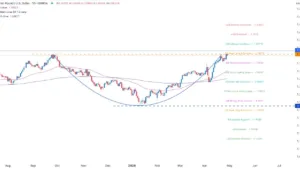
Trading Signals Providers in South Africa Must Be Licensed: FSCA Imposes Debut Fine
South Africa’s Monetary Sector Conduct Authority (FSCA) imposed an administrative penalty of over 1 million rand (about US$57,000) on Kabelo Emanuel Mogale for offering foreign currency trading indicators with out a monetary providers supplier licence and likewise debarred him for ten years.
It’s the first such administrative motion within the nation towards a buying and selling sign supplier.
Sign Suppliers Want a Monetary Providers Licence
In an announcement as we speak (Wednesday), the South African regulator clarified that “the follow of offering or publishing indicators with regards to on-line buying and selling in monetary merchandise falls inside the definition of economic providers within the FAIS Act, and as such, individuals offering such indicators require a monetary providers supplier licence.”
It additional highlighted that offering such trading signals with out a licence is a felony offence within the nation.
The motion towards Mogale resulted from an investigation following complaints obtained by the FSCA that he may need been “offering unauthorised monetary providers by Foreign exchange Personal Jet Injectors (Personal Jet).” The regulator discovered that Mogale offered foreign exchange indicators through Telegram to his shoppers and likewise advisable their “trades in foreign exchange forex pairs.”
“The Penalty Was Inevitable”
The character of the motion is uncommon as not one of the mature international markets require foreign exchange sign suppliers to be licensed.
Nonetheless, Jimmy Moyaha, Founder and MD of Lebowa Capital, thinks that “the penalty was inevitable.”
“Indicators are advisory in nature,” he added, “as they supply clear worth ranges and danger administration parameters for these taking the indicators. Advisory providers have at all times been regulated providers.”
Apparently, the Australian monetary market watchdog banned one financial influencer, or ‘finfluencer,’ from providing share buy suggestions on non-public on-line boards, mandating him to acquire a licence. Nonetheless, the Aussie company didn’t outline “sign suppliers” and if all such finfluencers would wish a licence.
Indicators suppliers in different jurisdictions additionally confronted actions for unlawful actions, however not significantly for unlicensed actions of offering indicators.
The South African regulator, alternatively, additionally elaborated that offering buying and selling indicators has receded to the follow of recommending trades and costs in monetary merchandise to shoppers. Sign suppliers normally earn a living by subscription charges or a share of income and even “profit by commissions paid by brokers” when shoppers undergo losses.
“It isn’t uncommon for sign suppliers to offer fictitious indicators and show uncertain proof of wealth to lure shoppers into collaborating,” the regulator highlighted, asking merchants to not interact with any unlicensed sign suppliers.
“The FSCA has communicated, on quite a few events previously, that sign suppliers should be appropriately licensed and controlled to supply these providers,” Moyaha added. “This primary fantastic demonstrates the potential penalties of not having the proper regulation in place as a service supplier.”
South Africa’s Monetary Sector Conduct Authority (FSCA) imposed an administrative penalty of over 1 million rand (about US$57,000) on Kabelo Emanuel Mogale for offering foreign currency trading indicators with out a monetary providers supplier licence and likewise debarred him for ten years.
It’s the first such administrative motion within the nation towards a buying and selling sign supplier.
Sign Suppliers Want a Monetary Providers Licence
In an announcement as we speak (Wednesday), the South African regulator clarified that “the follow of offering or publishing indicators with regards to on-line buying and selling in monetary merchandise falls inside the definition of economic providers within the FAIS Act, and as such, individuals offering such indicators require a monetary providers supplier licence.”
It additional highlighted that offering such trading signals with out a licence is a felony offence within the nation.
The motion towards Mogale resulted from an investigation following complaints obtained by the FSCA that he may need been “offering unauthorised monetary providers by Foreign exchange Personal Jet Injectors (Personal Jet).” The regulator discovered that Mogale offered foreign exchange indicators through Telegram to his shoppers and likewise advisable their “trades in foreign exchange forex pairs.”
“The Penalty Was Inevitable”
The character of the motion is uncommon as not one of the mature international markets require foreign exchange sign suppliers to be licensed.
Nonetheless, Jimmy Moyaha, Founder and MD of Lebowa Capital, thinks that “the penalty was inevitable.”
“Indicators are advisory in nature,” he added, “as they supply clear worth ranges and danger administration parameters for these taking the indicators. Advisory providers have at all times been regulated providers.”
Apparently, the Australian monetary market watchdog banned one financial influencer, or ‘finfluencer,’ from providing share buy suggestions on non-public on-line boards, mandating him to acquire a licence. Nonetheless, the Aussie company didn’t outline “sign suppliers” and if all such finfluencers would wish a licence.
Indicators suppliers in different jurisdictions additionally confronted actions for unlawful actions, however not significantly for unlicensed actions of offering indicators.
The South African regulator, alternatively, additionally elaborated that offering buying and selling indicators has receded to the follow of recommending trades and costs in monetary merchandise to shoppers. Sign suppliers normally earn a living by subscription charges or a share of income and even “profit by commissions paid by brokers” when shoppers undergo losses.
“It isn’t uncommon for sign suppliers to offer fictitious indicators and show uncertain proof of wealth to lure shoppers into collaborating,” the regulator highlighted, asking merchants to not interact with any unlicensed sign suppliers.
“The FSCA has communicated, on quite a few events previously, that sign suppliers should be appropriately licensed and controlled to supply these providers,” Moyaha added. “This primary fantastic demonstrates the potential penalties of not having the proper regulation in place as a service supplier.”









